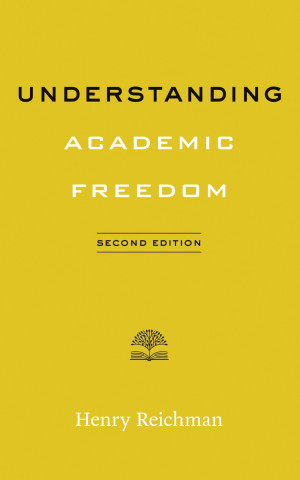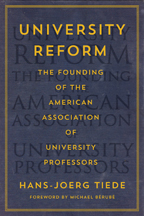- About
- Programs
- Issues
- Academic Freedom
- Political Attacks on Higher Education
- Resources on Collective Bargaining
- Shared Governance
- Campus Protests
- Faculty Compensation
- Racial Justice
- Diversity in Higher Ed
- Financial Crisis
- Privatization and OPMs
- Contingent Faculty Positions
- Tenure
- Workplace Issues
- Gender and Sexuality in Higher Ed
- Targeted Harassment
- Intellectual Property & Copyright
- Civility
- The Family and Medical Leave Act
- Pregnancy in the Academy
- Publications
- Data
- News
- Membership
- Chapters
Member Book Discount
Through an arrangement with the AAUP, Johns Hopkins University Press is offering a 30% discount off on four books that treat subjects of special interest to AAUP members. Please order directly from the press's website, http://www.press.jhu.edu/, using the discount code HWUP (this is the same code AAUP members can use to obtain a 30% discount on the AAUP Redbook).
Understanding Academic Freedom (second edition, March 2025)
By Henry Reichman
 Since the publication of the first edition of Understanding Academic Freedom, the never-ending struggle to defend academic freedom has entered a demonstrably new phase. Legislation determining what can and cannot be taught in schools in Florida, Texas, and other states has intensified governing board activism that impinges on widely accepted faculty prerogatives. Major donors in research, teaching, and institutional governance have grown bold in their interference. Highly polarizing controversies over antisemitism and the Israeli-Palestinian conflict, as well as debates over diversity, equity, and inclusion policies, continue to broil.
Since the publication of the first edition of Understanding Academic Freedom, the never-ending struggle to defend academic freedom has entered a demonstrably new phase. Legislation determining what can and cannot be taught in schools in Florida, Texas, and other states has intensified governing board activism that impinges on widely accepted faculty prerogatives. Major donors in research, teaching, and institutional governance have grown bold in their interference. Highly polarizing controversies over antisemitism and the Israeli-Palestinian conflict, as well as debates over diversity, equity, and inclusion policies, continue to broil.
Taken as a whole, these developments indicate that we have entered a new period in the history of American academic freedom. Academic freedom, long heralded as a core value of American higher education, may now be in as much danger as at any time since the 1950s. But what is academic freedom? Is it the right of faculty members to teach whatever they wish; a value upheld for supporters, but not opponents, amid polarizing controversy; or a narrow claim of privilege by a professorial elite, immune from public accountability? Henry Reichman, who chaired the American Association of University Professors' Committee A on Academic Freedom and Tenure for nearly a decade, mounts a rigorous defense of academic freedom and its principal means of protection: the system of academic tenure.
Probing academic freedom's role in multiple contexts, Reichman draws on a wealth of historical and contemporary examples to offer a comprehensive introduction to the concept in all its manifestations. This second edition addresses the most recent and pressing issues in academic freedom, making it an indispensable resource for understanding the current controversial climate.
The Future of Academic Freedom
By Henry Reichman
Foreword by Joan Wallach Scott

Academic freedom—crucial to the health of American higher education—is threatened on many fronts. In The Future of Academic Freedom, a leading scholar equips us to defend academic freedom by illuminating its meaning, the challenges it faces, and its relation to freedom of expression.
In the wake of the 2016 election, challenges to academic freedom have intensified, higher education has become a target of attacks by conservatives, and issues of free speech on campus have grown increasingly controversial. In this book, Henry Reichman cuts through much of the rhetoric to issue a clarion call on behalf of academic freedom as it has been defined and defended by the American Association of University Professors (AAUP) for over a hundred years. Along the way, he makes it clear that this is the issue of our day.
Over the course of ten audacious essays, Reichman explores the theory, history, and contemporary practice of academic freedom. He pays attention to such varied concerns as the meddling of politicians and corporate trustees in curriculum and university governance, the role of online education, the impact of social media, the rights of student protesters and outside speakers, the relationship between collective bargaining and academic freedom, and the influence on research and teaching of ideologically motivated donors. Significantly, he debunks myths about the strength of the alleged opposition to free expression posed by student activism and shows that the expressive rights of students must be defended as part of academic freedom.
Based on broad reading in such diverse fields as educational theory, law, history, and political science, as well as on the AAUP's own investigative reporting, The Future of Academic Freedom combines theoretical sweep with the practical experience of its author, a leader and activist in the AAUP who is an expert on campus free speech. The issues Reichman considers—which are the subjects of daily conversation on college and university campuses nationwide as well as in the media—will fascinate general readers, students, and scholars alike.
Henry Reichman is emeritus professor of history at California State University, East Bay, and served for many years as chair of the AAUP's Committee on Academic Freedom and Tenure. He is the author of Censorship and Selection: Issues and Answers for Schools.
University Reform: The Founding of the American Association of University Professors
By Hans-Joerg Tiede
Foreword by Michael Bérubé
 The American Association of University Professors (AAUP) was founded to advance the professionalization of America’s faculty. University Reform examines the social and intellectual circumstances that led to the organization’s initial development, as well as its work to defend academic freedom. It explores the AAUP’s subsequent response to World War I and the first Red Scare. It also describes the founders’ efforts, especially those of Arthur O. Lovejoy and James McKeen Cattell, in securing a greater role for faculty in the government of colleges and universities.
The American Association of University Professors (AAUP) was founded to advance the professionalization of America’s faculty. University Reform examines the social and intellectual circumstances that led to the organization’s initial development, as well as its work to defend academic freedom. It explores the AAUP’s subsequent response to World War I and the first Red Scare. It also describes the founders’ efforts, especially those of Arthur O. Lovejoy and James McKeen Cattell, in securing a greater role for faculty in the government of colleges and universities.
Hans-Joerg Tiede was at the time of his book's publication a faculty member at Illinois Wesleyan University, the chair of the AAUP’s Committee on the History of the Association, and a member of Committee A on Academic Freedom and Tenure. He served as editor of the eleventh edition of the AAUP’s Policy Documents and Reports, published in 2015.
The Rise and Decline of Faculty Governance: Professionalization and the Modern American University
By Larry G. Gerber
 The Rise and Decline of Faculty Governance is the first history of shared governance in American higher education. Drawing on archival materials and extensive published sources, Larry G. Gerber shows how the professionalization of college teachers coincided with the rise of the modern university in the late nineteenth century and was the principal justification for granting teachers power in making educational decisions. In the twentieth century, the efforts of these governing faculties were directly responsible for molding American higher education into the finest academic system in the world.
The Rise and Decline of Faculty Governance is the first history of shared governance in American higher education. Drawing on archival materials and extensive published sources, Larry G. Gerber shows how the professionalization of college teachers coincided with the rise of the modern university in the late nineteenth century and was the principal justification for granting teachers power in making educational decisions. In the twentieth century, the efforts of these governing faculties were directly responsible for molding American higher education into the finest academic system in the world.
In recent decades, however, the growing complexity of "multiversities" and the application of business strategies to manage these institutions threatened the concept of faculty governance. Faculty shifted from being autonomous professionals to being "employees." The casualization of the academic labor market, Gerber argues, threatens to erode the quality of universities. As more faculty become contingent employees, rather than tenured career professionals enjoying both job security and intellectual autonomy, universities become factories in the knowledge economy.
In addition to tracing the evolution of faculty decision making, this historical narrative provides readers with an important perspective on contemporary debates about the best way to manage America’s colleges and universities. Gerber also reflects on whether American colleges and universities will be able to retain their position of global preeminence in an increasingly market-driven environment, given that the system of governance that helped make their success possible has been fundamentally altered.
Larry G. Gerber, formerly the chair of the American Association of University Professors’ Committee on College and University Governance and the national vice president of the AAUP, is professor emeritus of history at Auburn University. He is the author of The Irony of State Intervention: American Industrial Relations Policy in Comparative Perspective, 1914–1939 and The Limits of Liberalism: Josephus Daniels, Henry Stimson, Bernard Baruch, Donald Richberg, Felix Frankfurter, and the Development of the Modern American Political Economy.

